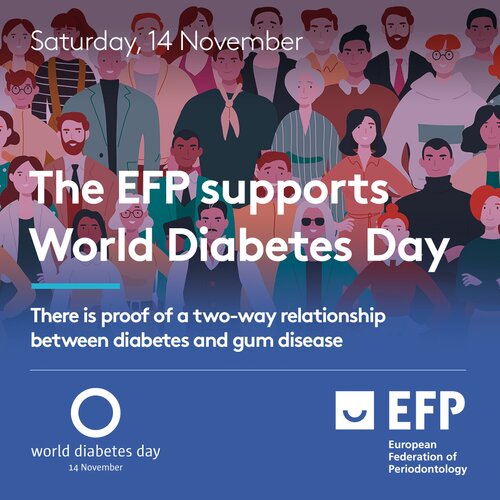![]()
13 November 2020
World Diabetes Day: EFP highlights latest research on perio-diabetes link
Categories:Communication, Science

To mark World Diabetes Day on 14 November, the EFP highlighted the latest research on the two-way relationship between periodontitis and type-2 diabetes.
Two years ago, on 14 November 2018, the EFP launched its Perio & Diabetes campaign. Since then, research has continued to explore the links between periodontal disease and diabetes, the effect of periodontitis treatment in diabetic patients, and other related areas.
Research published recently by the EFP’s Journal of Clinical Periodontology includes:
- Treatment of periodontitis reduces systemic inflammation in type 2 diabetes, Philip M. Preshaw et al. (Volume 47, issue 6; June 2020)
This study assessed the impact of periodontal treatment on systemic inflammation in type-2 diabetes. Periodontal treatment resulted in significant improvements in clinical status and reductions in gingival crevicular fluid biomarkers from baseline to month 12. There was a greater reduction in systemic inflammation following periodontal treatment in individuals with diabetes and periodontitis compared to those with periodontitis but not diabetes.
The research concluded that diabetes and periodontitis together appear to increase systemic inflammation, with evidence of reductions following periodontal treatment. In terms of practical implications, researchers said that “assessment of periodontal status should be routine in diabetes care, and treatment of periodontitis in people with diabetes should be a core component of diabetes management.”
- A randomized controlled trial of the effects of non‐surgical periodontal therapy on cardiac function assessed by echocardiography in type 2 diabetic patients, Yi Wang et al. (Volume 47, issue 6; June 2020)
Periodontitis significantly increases the risk of diabetic complications and this clinical trial investigated the effects of periodontal therapy on cardiac function in patients with type-2 diabetes mellitus (T2DM) and periodontitis. The study provides the first evidence that non‐surgical periodontal therapy may improve cardiac diastolic function in type-2 diabetic patients with periodontitis.
- “Salivary Biomarkers For Discriminating Periodontitis in the Presence of Diabetes”, Craig S. Miller et al. (23 October 2020, accepted for publication and undergone full peer review).
This study examined the ability of salivary biomarkers to discriminate periodontally healthy type-2 diabetics (T2DM) from T2DM who have periodontitis. It found that salivary MMP‐8 and IL‐1β discriminate periodontitis in T2DM.
- Association of hyperglycaemia with periodontal status: Results of the Northern Finland Birth Cohort 1966 study, Paula Tegelberg et al. (13 October 2020, accepted for publication and undergone full peer review).
This population-based cohort study investigated the association of hyperglycaemia and changes in glycaemic control with periodontal status in non‐diabetic individuals. The results suggest that impairment in glucose control in non‐diabetic individuals is associated with periodontal pocketing and alveolar bone loss.
- A Quantitative Bias Analysis to Assess the Impact of Unmeasured Confounding on Associations between Diabetes and Periodontitis, Talal S. Alshihayb et al. (8 October 2020, accepted for publication and undergone full peer review).
This study investigated unmeasured confounding in bidirectional associations between periodontitis and diabetes using quantitative bias analysis. It found that the presence of unmeasured confounding does not explain observed associations between pre‐existing diabetes and incident periodontitis. However, the presence of weak unmeasured confounding eliminated observed associations between pre‐existing periodontitis and incident diabetes. These results clarify the bidirectional periodontitis‐diabetes association.
Perio & Diabetes campaign
Two years ago, on 14 November 2018, the EFP launched its Perio & Diabetes campaign – a package of written and graphic materials aimed at different audiences. The Perio & Diabetes project was produced thanks to an unrestricted grant from EFP partner Sunstar, and the material is based on the findings of the Perio-Diabetes Workshop, held in Madrid in February 2017, which was organised jointly by the EFP and the International Diabetes Federation (IDF), in partnership with Sunstar
The core of the Perio & Diabetes campaign is the six recommendation guidelines specially produced for different dental professionals, other medical professionals, researchers, policymakers, patients and the public, and the media. There are also shorter brochures, lively infographics, and an animated video in seven languages.
"Diabetes and periodontal diseases are now clearly linked with bidirectional interactions and periodontal diseaess have been recognised as a major complication in diabetes," noted EFP president Xavier Struillou. "A common approach between the diabetologist and the periodontist is essential for a long-term stabilization of both diseases. The campaign with the IDF was very important for the EFP to help improve the global health of diabetes patients."




